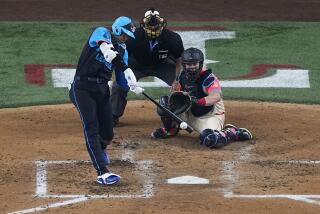Just What Selig Didn’t Need: Another Stalemate
MILWAUKEE — Now, of course, they will expand the All-Star rosters, and there will still be problems.
Now, of course, they will go from 30 players on each team to maybe 33 or 34 or 35, and the respective managers will be faced with the nightmare task of squeezing them all into a nine-inning game or sending some home disappointed, even angry they weren’t used and wondering why they were asked to attend.
That, however, will be far better than what happened at Miller Park Tuesday night.
The 73rd edition didn’t end after nine innings.
It went through 10 and then 11 innings, becoming an All-Star game in the truest sense since all 60 players were used, the disappearing rosters eventually translating into the latest and--momentarily, at least--worst of Commissioner Bud Selig’s ongoing nightmares.
Rather than extending and risking injuries to the last two pitchers on the American and National teams--Freddy Garcia of the Seattle Mariners and Vicente Padilla of the Philadelphia Phillies--he decided to call it after 11 innings, leaving it tied, 7-7, and a crowd of 41,781 chanting “Let them play, let them play.”
Imagine.
Bud Selig, who brought baseball back to Milwaukee, who got the taxpayers to help him build this $400-million ballpark, was now being booed from his front row box as he exited through the National League dugout and fans threw debris on the field.
Imagine.
His crowning night turning into a crown of thorns.
Imagine.
An All-Star game that had supplied enough magic moments to momentarily freeze the negative flow, an All-Star game played against the distracting backdrop of a potential strike and possibly pervasive steroid use, amid the fresh memory of Darryl Kile and Jack Buck and the disgraceful fight between relatives of the late Ted Williams (don’t they know, as the Newsday headline said, “There’s No Cryonics In Baseball”), has now become just one more ugly incident.
Selig would apologize to the fans, saying he understood their unhappiness.
He would commend Managers Bob Brenly and Joe Torre for doing what the fans want them to do, which is use all of their players.
He would say that the roster situation would be re-evaluated and that the rosters would probably be enlarged.
This, he said, should enable All-Star managers to avoid a repeat of what had just happened and also reduce the criticism that annually accompanies the selection process and the inevitable number of snubbed players.
It was actually possible to feel a little sorry for the commissioner.
He was in a no-win situation.
“It would be highly improper to blame Bud or anyone else,” said Brenly, the Arizona manager.
“The other managers and organizations entrust us with their players. Can you imagine the reaction if we return them hurt or unable to take their regular turns in the rotation?”
Torre agreed.
“You can’t have it both ways,” the Yankee manager said. “You can’t ask us to use all of our players and then get upset when we don’t have anyone left. Bob and I both saved a starting pitcher for the end in case he had to pitch more than an inning, but the last thing I want to do is send Freddy Garcia back to [Seattle Manager] Lou Piniella hurt and I’m sure that the last thing Bob wanted to do was send Padilla back to [Philadelphia Manager] Larry Bowa hurt.
“I feel bad for Bud, but he had no choice.”
Neither Garcia nor Padilla had pitched in five days, meaning they were on a regular schedule, but Piniella and Bowa would have been justified in reacting angrily if either had been extended beyond the two innings they each pitched.
As it was, Torre, who usually doesn’t pick pitchers who have worked on the Sunday before the Tuesday game, did break that unwritten rule for this game to pick the deserving Barry Zito, but he allowed Zito to pitch to only one batter in the sixth inning and he used Eddie Guardado, the Minnesota closer, to pitch to only two batters in finishing that inning--those limited stints, perhaps, coming back to haunt him in extra innings.
Similarly, Brenly used both Mike Remlinger and Byung-Hyun Kim in the four-run AL seventh as Kim took a page out of his disastrous October resume.
It was not a good night for the All-Star relievers on either team, including Eric Gagne. The Dodger closer was whacked for a home run by Alfonso Soriano.
The toll eventually led to the unsatisfactory and unpopular conclusion, wiping out a tasteful pre-game show that included tributes to Williams, a parade of Hall of Fame players and just about every former Milwaukee star except Bernie Brewer. It also wiped out a Torii Hunter catch that is certain to be included in every All-Star montage.
The Minnesota center fielder soared high above the fence in right-center to take a home run away from Barry Bonds in the first inning and leave Sammy Sosa undecided on whether to describe Hunter as Michael “Air” Jordan or Superman. It was proved two innings later that he is not Superman, and that Bonds can be deprived but not denied. Not even Superman was going to catch his smoking drive off the facade of the second deck in right.
Hunter and Bonds would have been candidates for the most valuable player award that is now named after Williams, but no award was given because of the unique way the game ended.
Let ‘em play? They’ll try it in the future with more than 30 players on a side. That might lead to arguments of another kind, but we should at least have a winner and loser.
More to Read
Go beyond the scoreboard
Get the latest on L.A.'s teams in the daily Sports Report newsletter.
You may occasionally receive promotional content from the Los Angeles Times.










